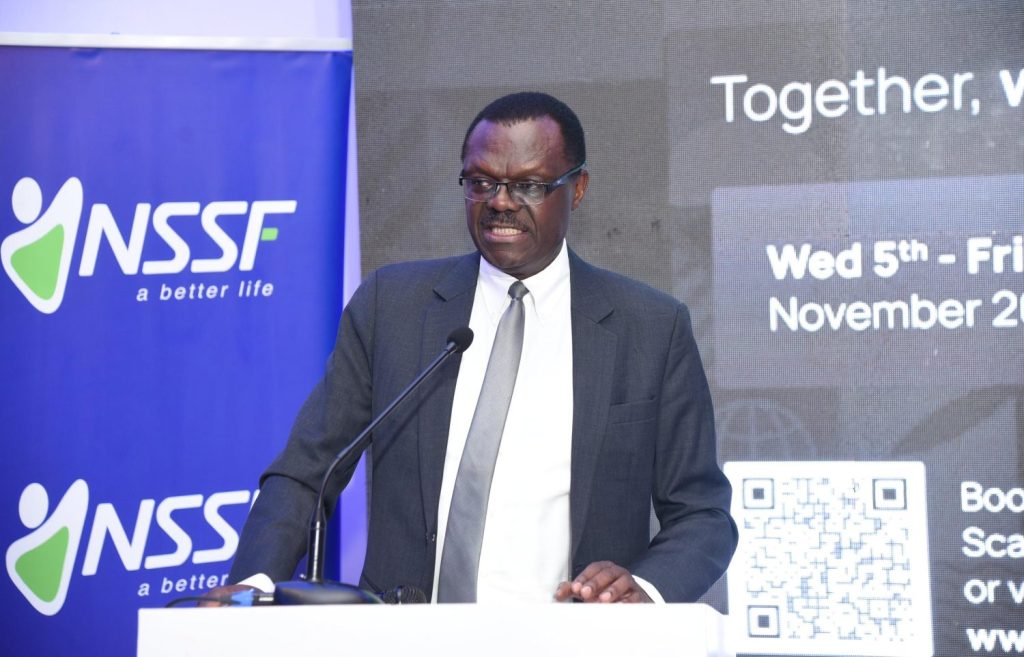For the first time, pension funds across Africa are joining forces to pool resources for the continent’s development needs, reducing reliance on traditional foreign funding, according to leaders of Africa’s pension industry.
The Secretary General of the Africa Social Security Association (ASSA), Mr Meshach Bandawe, Patrick Micheal Ayota, the Chairperson of the International Social Security (ISSA) East Africa Liaison Office, and Mr Leonard Zulu, the United Nations Resident Coordinator for Uganda, all echoed the need for new and innovative sources of funding for Africa’s development needs, given the reduction in foreign funding and realignment of the global geopolitics.
According to the African Development Bank, Africa faces significant annual financing gaps, with overall development goals requiring over $1.3 trillion annually.
The call was made as pension funds across Africa prepare to come together to commit to a “Fund for Africa” at the “$700b in 1 Room” All Africa Pensions Summit to be held from 5th – 7th November at the Munyonyo Convention Centre in Kampala, Uganda.
The Summit will be hosted by NSSF Uganda, under the theme “Pension Funds – Powering Africa’s Growth”. It will focus on deepening the patient capital pool, Strengthening Partnerships for Maximum Impact, Pension Funds as Catalysts for Infrastructure Development, and enhancing social impact.
“Pension funds across Africa hold about $700 billion in assets under management. This is a major opportunity for Africans to catalyse our own economies by providing funding that is not tied to unfavourable conditions from foreign funding agencies,” Mr Ayota said.
Ayota, who is also the Managing Director of NSSF Uganda, East Africa’s biggest fund valued at more than $7 billion, added that due to the realignment of global geopolitics, the traditional sources of foreign funding for Africa can no longer sustain the pace at which the continent’s infrastructure requirements are expanding.
Mr. Zulu was emphatic, adding that Africa must look inward, mobilizing domestic savings, diaspora remittances, and blended financing models to reduce aid dependency.
“The traditional models of development cooperation are being redefined, and official development assistance, though vital, is no longer sufficient to meet the scale and complexity of the challenges Africa faces today,” he said, adding: “We see declining aid flows, shifting geopolitical priorities, and funding uncertainties more than ever before. It is vital to formulate actionable solutions for enhanced domestic resource mobilization and innovative financing to support national development strategies while fostering resilience and sustainability.”
Furthermore, he noted that with 15 of the 20 traditional donor partners having reduced their funding, there is now a need to rethink how development is financed. Africa needs to shift from aid to trade, enabling small and medium enterprises to access capital, which is required to achieve the national goals.
Mr Bandawe, who heads an association of African pension funds, said that it is high time African infrastructure funding requirements are addressed by Africans.
“Pension funds are increasingly being recognised as critical levers for inclusive development and can be key players in unlocking long-term capital for infrastructure, stimulating agriculture, climate change financing and social impact,” he said.
Africa has 51 pension and social security funds, according to records at the Geneva-based International Social Security Association (ISSA).
“Fortunately, there are several examples across Africa where pension and social security funds that are members of the Africa Social Security Association have provided locally mobilised capital, for example, in Tanzania. African pension providers must coalesce around this new approach, given that the sources of foreign funding are drying up,” Mr Bandawe said.
The Summit has attracted Chief Executive Officers of Pension funds across Africa, Chief Investment Officers, Global Investors, Development Finance Institutions, Venture and Private Capital, Policy makers, and government officials from across the African continent and beyond.
The National Social Security Fund Uganda is a multi-trillion Fund mandated by the Government through the NSSF Act (Cap 230), to provide social security services to all eligible employees in Uganda.
The Fund is a secure, innovative, and dynamic social security provider that guarantees safety, security, and a return on members’ savings of at least 2% above the 10-year inflation average.
The Fund manages assets worth over UGX 26 trillion, invested in Fixed Income, Equities, and Real Estate assets within the East Africa region.
The Minister of Gender, Labour & Social Development, and the Minister of Finance, Planning & Economic Development are responsible for policy oversight of the Fund.
The All-Africa Pensions Summit is a meeting of leading social security and pensions funds across Africa and beyond. It will take place from 5th – 7th November 2025 at Speke Resort Convention Centre, Munyonyo, in Kampala, Uganda, under the theme “Pension Funds – Powering Africa’s Growth.”
The Summit will be hosted by NSSF Uganda, East Africa’s largest social security Fund by value.
At the Summit, decision makers from African pension Funds will interact with various key stakeholders to collaboratively address the continent’s challenges to unlocking the full potential of pension capital for Africa’s economic and social development.


